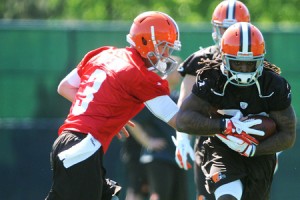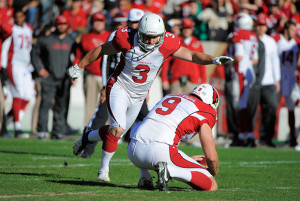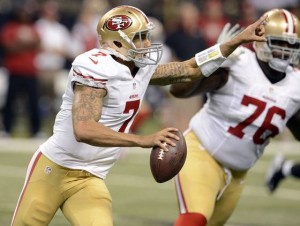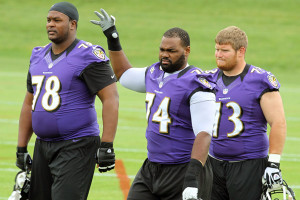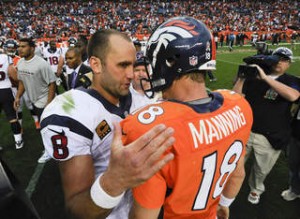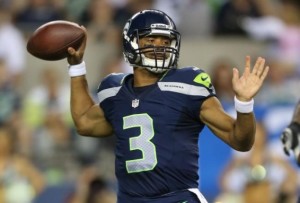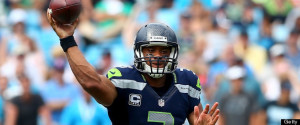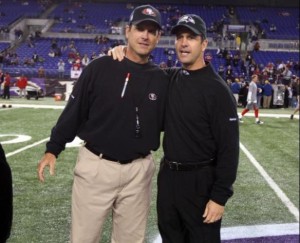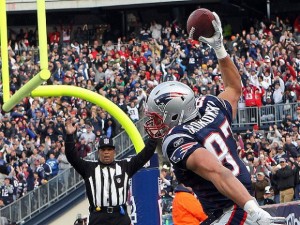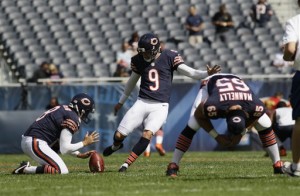After defeating the Saints 26-20, the Jets now own a 5-4 record. New York was ranked 32nd by ESPN in their pre-season power rankings, a fact Rex Ryan brings up during every other press conference. But while the record is a pleasant surprise, the Jets aren’t necessarily playing well. Or, at least, they play really, really badly in their losses. In fact, the Jets have the worst points differential of any team with a winning record after nine games in NFL history:
[continue reading…]
Least Valuable Player: Tie: Blaine Gabbert, Jacksonville Jaguars and Brandon Weeden, Cleveland Browns; Dishonorable mention: Carson Palmer, Matt Schaub, Eli Manning, Josh Freeman
Blaine Gabbert has just 1 touchdown pass against 7 interceptions, and his awful 1.21 ANYA average puts him in the company of Caleb Hanie, Keith Null, Ken Dorsey, rookie Alex Smith, Kurt Kittner, and Spergon Wynn. On the other hand, Gabbert has thrown just 86 passes, so Brandon Weeden — who has been slightly better — has been arguably more not valuable due to accumulating more than twice as many pass attempts. The Jaguars have looked much better with Chad Henne at quarterback, while Cleveland’s offense looks much worse with Weeden than behind either Brian Hoyer or Jason Campbell. Gabbert and Weeden are former first round picks who appear to earn playing time out of obligation or hope rather than merit.
Really Offensive Player of the First Half (non-QB edition): Chris Johnson, Tennessee Titans. Dishonorable mention: Mike Wallace ($); Kenny Britt (brain); Jermaine Gresham (run blocking)
Johnson is the second most expensive running back in the NFL, and has produced the following stat line:
| Rushing | Receiving | |||||||||||||
|---|---|---|---|---|---|---|---|---|---|---|---|---|---|---|
| Year | G | Att | Yds | TD | Lng | Rec | Yds | TD | Lng | YScm | RRTD | |||
| 2013 | 7 | 115 | 366 | 0 | 23 | 3.2 | 52.3 | 15 | 167 | 11.1 | 2 | 66 | 533 | 2 |
Johnson has not run for a touchdown this season. He’s run for one first down on third down all season. His yards per carry average is embarrassing for any runner, much less a player who is supposed to be one of the most explosive in the game. Tennessee invested heavily in the offensive line in the offseason, drafting Chance Warmack with the ninth pick in the draft and throwing big money at Andy Levitre. Jake Locker has progressed this season, but Johnson has held the offense back. Even Jackie Battle and Shonn Greene (40 runs for 146 yards) have higher YPC averages than Johnson. The former 2,000-yard runner has rushed for fewer than 40 yards in each of his past four games.
Really Offensive Defensive Player of the First Half: DeMeco Ryans, Dishonorable mention: Cortland Finnegan (terrible against the run and the pass), Quinton Coples (former first round pick has disappeared in year three), Julius Peppers (little production, $16M cap value)
Ryans is one of the highest paid inside linebackers in the league, but he’s Pro Football Focus’ 2nd worst inside linebacker this year. The worst is his Eagles teammate, Mychal Kendricks, and the duo is one of several reasons the Eagles have struggled defensively this year. PFF has Ryans 5th in the league with 7 missed tackles (Kendricks is first), and he continues to be well-below average in both pass coverage and pass rushing. Ryans is the fifth highest paid Eagle, and with a base salary of $6.8M next year, it’s hard to imagine him returning in 2014.
Worst Offensive Coordinator: Tie: Mike Sullivan (Tampa Bay), Kevin Gilbride (New York Giants). Dishonorable mention: Todd Haley (just because), Brian Schottenheimer (have you watched the Rams?)
Sullivan learned under Gilbride for years in New York, and the Bucs and Giants run similar offensive systems. A lot of deep passes, one-on-one routes where you expect your wide receiver to beat their defensive back, and option routes where the quarterback and wideout have to be on the same page. That leads to a high-variance outcome on offense — think the opposite of what’s happening in Kansas City – and right now, the two teams are 2-15 in large part because of the struggles of their respective offenses. The Giants lead the league in interceptions, while the Bucs have the lowest completion percentage in the league.
Worst Defensive Coordinator: Tie: Alan Williams (Minnesota), Bob Babich (Jacksonville). Dishonorable mention: Mike Nolan (Falcons), Jim Haslett (Redskins).
Babich isn’t working with much, but the Jaguars defense is so far below the baseline that you can’t justify those results. Opposing passers have a 106 passer rating against Jacksonville, while the Jaguars also rank 32nd in rushing yards and rushing touchdowns allowed (and 31st in yards per carry allowed). Jacksonville has allowed 210 points through the first three quarters of games this year, the most of any team since the merger. The Vikings defense isn’t as devoid of talent, but has been only slightly better. The Vikings are 31st in PFR’s Expected Points Added metric, and the Vikings rank in the bottom three in both points and yards allowed. Minnesota ranks dead last in first downs allowed, too, a year after posting some pretty respectable defensive numbers.
Worst Head Coach: Greg Schiano, Tampa Bay Buccaneers. Dishonorable mention: Leslie Frazier (Vikings); Tom Coughlin (Giants)
One could spend hours reciting the career of Schiano in Tampa Bay, but that parade of horribles is too depressing to review on a Sunday. Tampa Bay is 0-7, Schiano has lost control of the team, and the only thing left to do is figure out when he will be fired. A week nine trip to Seattle should be a disaster, but this team is talented enough to put together a 2013 Chiefs run next year under new management. Relieved of his duties, Schiano will now be available to testify as an expert witness on how not to handle your quarterback situation.
Offensive Rookie: Three-way tie: Eric Fisher, Chiefs; Luke Joeckel, Jaguars; Lane Johnson; Eagles. Dishonorable mention: Tavon Austin (St. Louis)
Offensive tackles aren’t sexy picks, but they occasionally work their way into the top five because of how “safe” they are. This year, Fisher and Joeckel were the first two picks in the draft, while Johnson was the third offensive player selected, going fourth overall after Dion Jordan went to Miami. If you didn’t watch football, you might think Fisher is having a great year, as the number one overall pick went to a 2-14 team that has started 8-0. In reality, he’s been a disaster even at right tackle. He’s the third-lowest graded offensive tackle by Pro Football Focus, while Branden Albert has solidified the left tackle spot. Joeckel was playing poorly in Jacksonville at right tackle and then went down with a season-ending injury, proving that nothing can go right for the Jaguars this year. Johnson has allowed 7 sacks and 29 hurries this year according to PFF, and both marks put him in the bottom five among offensive tackles.
Defensive Rookie: Dee Milliner, New York Jets. Dishonorable mention: Barkevious Mingo (Cleveland), Jarvis Jones (Pittsburgh)
Milliner has been arguably the worst cornerback in the league this season. The Jets have seen much more bad (his play) and ugly (the multiple benchings) than good from the former Alabama star. In my preseason preview, I said that we shouldn’t expect much from Milliner right away, as Football Outsiders has pointed out several times that even the best rookie cornerbacks tend to struggle. Still, Milliner has been horrible through eight weeks, even if his future may still be bright (Kareem Jackson was another great Crimson Tide corner who was a disaster as a rookie, and has turned into a solid cornerback in Houston). For a top ten pick, there’s still a minimum amount of production one should expect, and being outplayed by undrafted free agent Darrin Walls falls below that bar.
The 2013 Game Scripts record was broken not once but twice in week eight. In an unsurprising turn, the 49ers obliterated the Jaguars in London 42-10, holding an average lead of 21.3 points, breaking the largest average margin previously held by… Seattle against Jacksonville. But it was the Bengals demolition of the Jets in Cincinnati that set the new Game Scripts record.
The Bengals took a 14-0 lead with 4:26 left in the first quarter; by halftime, the score was 28-6. The first play from scrimmage in the second half was an interception of a Geno Smith pass that was returned for a touchdown by Chris Crocker, and Marvin Jones’ fourth touchdown reception of the day brought the Bengals lead to 42-9 before the end of the third quarter. The final score of the game was another pick six of Smith, this time by Adam Jones, at the start of the fourth quarter. The game was every bit as ugly as this paragraph makes it sound. For the record, both San Francisco and Cincinnati had Moral Margins of Victory of over 30 points, which puts them in the top five for the season.
Last week, the Patriots were the only team with a positive Game Script to lose; this week, New England is one of just two teams with a negative Game Script to win. That game was a pretty weird one: New England rushed on 37 of the team’s 59 plays from scrimmage against Miami. The Patriots threw just 22 passes, the lowest by New England in a game since a extremely windy week 17 visit to Buffalo in 2008. For Tom Brady, this was the fewest attempts in a game for him — excluding games where he was injured or meaningless games where he was benched — since 2005. And this came in a game where the Patriots had a negative Game Script! Brady and the passing game are really struggling — the Patriots rank 31st(!) in Net Yards per Attempt — but it’s still just weird to see New England be so run heavy. Then again, the Patriots had 100 net passing yards on 25 dropbacks against the Dolphins, while Stevan Ridley and LeGarrette Blount had 125 yards on 25 carries.
Below are the week 8 Game Scripts:
[continue reading…]
In week 2, Seattle crushed San Francisco. In week three, the 49ers lost to Indianapolis.
In week 3, the Seahawks suffocated the Jaguars; in week four, Jacksonville lost to the Colts.
In week 4, Seattle won at Houston; in week five, Houston was embarrassed by the 49ers.
In week 5, the Seahawks played a tight game with Andrew Luck’s Colts, but lost 34-28. In week six, Indianapolis was upset in San Diego.
In week 6, Seattle defeated the Titans; in week seven, Tennessee lost against San Francisco.
As a result, NFL teams are 0-6 this year in games played the week after facing Seattle. Surely this is because of the physical style employed by the Seahawks, and not a quirky stat aided by the fact that four of those games came against the 49ers and Colts. Carolina nearly ended this streak before it began, but was too bruised up to prevent EJ Manuel from finding Steve Johnson alone in the end zone with six seconds left, giving the Bills a 24-23 win. And while at first glance, the Colts loss in San Diego is your classic let-down/look-ahead sandwich (after beating Seattle in week 5 and getting ready for the Peyton Manning return in week 7), the truth is, Indianapolis was just incapable of mustering the physical temerity necessary to beat the rugged Chargers.
Seattle beat the Cardinals in week seven, but the circumstances ensure that this streak will continue to be discussed. If Arizona loses to Atlanta in week eight, that would run the record to 0-7; if the Cardinals win, well, they had an extra three days of rest, so teams would still be winless in games on normal rest after playing the punishing Seahawks.
The “record” for worst record by teams after playing Team X the prior week is 1-13, with the ’97 Packers being Team X. The lone win came when the Vikings, after losing in Green Bay in week four, rebounded to overcome Ty Detmer and the Eagles in week five. You might think there’s something legitimate here — after all, the Packers had Brett Favre, Reggie White, and were the defending Super Bowl champions. Perhaps teams were so “up” to play Green Bay that they were very prone to let downs the following weeks. I’m not convinced.
[continue reading…]
Kicking a field goal down by 18 this late in the game is a poor decision unless it’s fourth and impossible. Since 1940, do you know how many teams have kicked a field goal, when trailing by 18 or more points in the second half, and went on to win the game? THREE. The “They Are Who We Thought They Were” game, when Chicago kicked a 23-yard field goal down 20-0 midway through the third quarter. After that field goal, Mike Brown, Charles Tillman, and Devin Hester scored touchdowns for the Bears, which doesn’t seem like the best model to follow in the future since none of those players played offense.
In 1998, the Rams kicked a field goal in Buffalo to make it 28-13 in the third quarter, ultimately winning 34-33 on a touchdown run in the final seconds. And in 1996, in Bill Parcells’ return to the Meadowlands to face the Giants, Adam Vinatieri kicked a third-quarter field goal down 22-0, and then Terry Glenn, Dave Meggett (on a punt return), and Ben Coates scored fourth quarter touchdowns.
You know what hasn’t happened? A team kicking a field goal, down by 18 or more points in the fourth quarter, and going on to win the game. Including the two teams this year, 117 teams since 1940 have kicked a fourth quarter field goal when trailing by more than 17 points, and none of them have ever won. I know, trailing by 18, it’s so comforting to kick a field goal and think “hey look, all we need to do is stop them, score a touchdown, stop them again, score a touchdown, convert a two-point conversion, and then win in overtime.” But that’s never, ever happened before.
[continue reading…]
The Patriots and Pythagoras
To be fair, the Patriots sole loss was a nail-biter, too: it wasn’t until Adam Jones intercepted a Tom Brady pass at the Bengals three-yard line with 26 seconds remaining that Cincinnati sealed the 13-6 win. Still, New England has “only” outscored its opponents by 28 points so far this year. That’s a pretty low number for a 5-1 team.
From 1920 to 2012, 222 teams started the season with a 5-1-0 record. In an odd bit of trivia, the only one of those teams with a negative points differential through six games was a Super Bowl champion: the 1976 Oakland Raiders, who were blown out by the Patriots in week four but finished the year 16-1 (including a controversial revenge victory against New England in the playoffs).
If we limit ourselves to just post-merger teams, there are 148 teams that started 5-1-0 prior to 2013. If we throw out the strike seasons, that leaves us with 139 teams. This is the part of the post where you’d expect the teams with the highest points differential to perform the best over the rest of the season, but that actually hasn’t been the case.
[continue reading…]
1) Calculate how many standard deviations above/below average each team is in Game Scripts. The average Game Script, of course, is zero. The standard deviation through five weeks is 4.69, so the Broncos (8.43 Game Script) are 1.80 standard deviations above average in Game Script.
2) Calculate how many standard deviations from average each team is in Pass Ratio, defined as pass attempts (including sacks) divided by total plays. The average Pass Ratio through five weeks is 59.8%, while the standard deviation among the thirty-two teams is 6.7%. The Giants (excluding last night’s game) lead the league in Pass Ratio at 71.8%, which is 1.79 standard deviations above the league-average Pass Ratio.
3) Add how many standard deviations above/below average each team is in both Game Scripts and Pass Ratio. To convert these into an Index (and a more intuitive number for folks), multiply that result by 15 and add it to 100. So a team that has a Pass Identity that is 1 standard deviation above average will be at 115, while a team that is 1.6 standard deviations below average will be at 76.
Here are the results:
[continue reading…]
This week, the 49ers’ blowout victory against Houston produced the highest Game Script at 18.3, putting it just a hair behind the Seahawks victory over Jacksonville (18.4) on the list of highest Game Scripts in 2013. (We’ll see if Denver/Jacksonville gets the Game Script over 20. The highest Game Script of all time was the Patriots 59-0 blowout in the snow against the Titans, clocking in at 33.7.) Colin Kaepernick completed six passes, but you don’t need to complete many passes when your team is leading by 18 points throughout the game. San Francisco went up 7-0 ninety seconds into the game following a Tramaine Brock pick six of Matt Schaub, and things stayed ugly from there. That reminds me: pick sixes continue to be up this year, an issue I discussed in the dead of March.
Without further ado, the Week 5 Game Scripts:
[continue reading…]
PFF gives Monroe slightly better grades, but Mike Tanier wrote a pretty scathing review after studying film on the the former Jaguars’ left tackle. On the other hand, PFF loved Monroe last season, ranking him as their 10th best left tackle. So was this a good deal for Baltimore? For Jacksonville?
The Jaguars end seems easier to analyze. Monroe is a free agent after the season, and the team didn’t view him as an elite left tackle (after all, the Jaguars drafted Luke Joeckel with the expectation that he would take over after Monroe left). That left them with three options: trade him now, let him play out the season and then walk, or franchise him and try to trade him for more in the spring. The latter would be the riskiest option, given that (1) they would be overpaying him, since he isn’t worth franchise tackle money, and (2) Kansas City was unable to unload Branden Albert last season (and for all we know, the Jaguars unsuccessfully tried to deal Monroe last year, too). So for Jacksonville, the benefit to keeping him would be getting 12 more games out of Monroe in a lost season and a 2015 compensatory pick (probably a 4th or 5th rounder).
Instead, Jacksonville received the Ravens 4th and 5th rounders next season. That’s hardly a good return on the 8th overall pick the team invested in him, but that’s a sunk cost at this point (and goes on the ledger of prior management). Trading him was the right move, although we don’t know if they could have gotten more from another team.
As for Baltimore? The team is now without its 4th, 5th, and 7th rounders last season, and may not have much to show for it in 2014 (the 7th was a conditional pick for A.Q. Shipley, currently backing up Gino Gradkowski at center). Baltimore does not have much cap room, which (1) will make it more difficult to resign Monroe (although he already has stated that he wants to stay in Baltimore), and (2) makes it even more important for the team to hit on its draft picks. The outlook isn’t much better for 2014: perhaps the Ravens can restructure the contract of Terrell Suggs, but Baltimore already has $115M allocated to just 40 players next year (and Haloti Ngata ($16M), Flacco ($14.8M), and Lardarius Webb ($10.5M) all have huge cap numbers).
[continue reading…]
For the second week in a row, the Jaguars had the worst Game Script score. And for the second week in a row, Peyton Manning’s Broncos held an average lead of over 15 points. These two teams play in Denver in week six, and the early reports suggest that the line will be 27 points, the highest spread in N.F.L. history. The current record was set in 1976, when the expansion (and winless) Bucs traveled to Pittsburgh to face a Steelers team that had won the past two Super Bowls and had allowed just 28 points in their last seven games. That game had a spread of 26 points, and the Steelers won 43-0.
Here’s how to read the table below. The Colts won in Jacksonville (you can click the boxscore to see the full PFR boxscore), 37-3. Indianapolis won by 34, and held an average lead of 15.5 points throughout the game. Andrew Luck, Trent Richardson, and the rest of the Colts had 41 passes and 29 runs, giving them a 58.6% pass/run ratio. Meanwhile, the Jaguars threw 35 passes and had just 17 runs, giving them a 67.3% pass/run ratio. With few exceptions, the team with the positive game script has the lower pass/run ratio, and that effect is just magnified when the Game Script is large.
[continue reading…]
Here’s how to read the Seahawks-Jaguars line. Seattle won at home against the Jaguars, 45-17, a 28-point margin of victory. The average lead for the Seahawks of every second of every game — the Game Script score — was 18.4 points. Seattle had 31 pass attempts against 35 runs, a 47% pass/run ratio. Jacksonville had 42 passes and 23 runs, a 64.6% pass/run ratio.
[continue reading…]
This week at the New York Times, I examine the disappointing San Francisco 49ers.
From the moment Coach Jim Harbaugh arrived in San Francisco in 2011, the 49ers have been one of the N.F.L.’s best teams.
In Harbaugh’s first two seasons, the 49ers ranked third in combined wins (24) and points differential (275), trailing only the New England Patriots and the Green Bay Packers in both categories. In those two seasons, San Francisco allowed 502 points, easily the fewest in the league. Even after losing in the Super Bowl in February, Harbaugh’s 49ers seemed poised to become the next dynasty. But after defeating the Packers in Week 1, San Francisco has been outscored, 56-10, in the last two weeks.
In Seattle, the 49ers were 3-point underdogs, and lost, 29-3. At home against the Indianapolis Colts, San Francisco was a 10 ½-point favorite, and lost by 20 points. For the season, San Francisco has fallen short of expectations — defined as the point spread in the game — by an average of 17.5 points a game (only the Giants, at 18.3 points, have been more disappointing). How have teams with similar expectations and results fared over the course of the rest of the season?
From 1990 to 2012, 14 teams have met three criteria: won at least 10 games in the previous year; on average, were favored to win the first three games of the next season; and failed to cover the spread by, on average, at least 10 points. On average, those teams won 12.5 games the previous season but just eight in the season in question, an indication that the slow start is a sign of mediocre things to come.
The 2001 St. Louis Rams and the 2006 Chicago Bears lost in the Super Bowl, then both finished 7-9 the next season. The 2006 New Orleans Saints made it to the N.F.C. championship game, then started 2007 with four losses, and finished 7-9. Three games is a small sample size for the 49ers, but last year’s success guarantees nothing but high expectations. And only one of those 14 teams — the 2007 Saints — fell as far short of expectations (as measured by points differential relative to the point spread) as this year’s 49ers.
There might be more hope for a turnaround if San Francisco’s struggles were contained: unfortunately for 49ers fans, the team has struggled in every aspect of the game. The biggest surprise has been the fall of a dominant rush defense.
Two years ago, the 49ers did not allow a rushing touchdown until the 15th game of the season; last year, three of the team’s four linebackers (Aldon Smith, NaVorro Bowman and Patrick Willis) were named first-team All-Pro by The Associated Press, as the run defense finished in the top five in rushing yards, yards per carry and touchdowns allowed.
This season, the 49ers have allowed six rushing touchdowns. The struggles are not just at the goal line: Harbaugh’s 49ers allowed 170 rushing yards just once in his first 38 games (including the postseason). But they have allowed more than that in back-to-back weeks this season against the Seattle Seahawks and the Colts.
You can read the entire article here.
So far this season, one thing is obvious: the NFL scheduled Thursday night games every week for the express purpose of screwing with people who do data analysis. Even though week three has started, I’m not ready to close the door on week two, in which nearly every game was competitive into the fourth quarter. But that doesn’t mean the game script for every game was close.
Steven Jackson was injured early in his revenge game against the Rams (and is expected to miss two-to-four weeks), but consider: Atlanta had 45 pass attempts against just 16 running plays in a game in which their average lead was 13.4 points. And that was with a gimpy Roddy White! Last year, I noted that the Falcons were the most pass-happy team in the NFL after adjusting for game script, and it appears that the model hasn’t changed in 2013.
There weren’t any huge comebacks this week, a byproduct of all the competitive games. The Cardinals scored nine points in the fourth quarter to beat the Lions, in a game where Detroit’s offense was shut out in the second half. Matt Stafford and company gained just 90 yards and four first downs on 24 second half plays, enabling the Cardinals to steal a win. Half of the team’s six second half drives were three and outs, one was a fumble on the second play, and the final drive was five plays and ended on downs. The only successful drive of the half was a 51-yard march that put the Lions at the Cardinals 27, but David Akers’ field goal attempt was blocked.
But while the offense had an off day, there’s a hidden factor that explains why Detroit didn’t score more than 14 offensive points (DeAndre Levy intercepted a Carson Palmer pass for 66 yard touchdown, accounting for the other seven points).
[continue reading…]
Steven Hauschka’s field goal with 9:40 left in the second quarter was the first score of the game; that means for the first 20 minutes and 20 seconds, the score was tied. Cam Newton responded with a touchdown drive, hitting Steve Smith for a three-yard score with 3:20 left in the half. So for six minutes and twenty seconds, the Panthers trailed by three. It wasn’t until 2:26 left in the third quarter that the next score occurred, courtesy of Hauschka’s second field goal of the day. This means the Panthers led by four for fifteen minutes and fifty-four seconds. Russell Wilson threw the game-winning touchdown with 10:21 remaining, the final score of the day. This means for 7:05, the Seahawks trailed by a point, and then for 10:21, Seattle led by five points (following an unsuccessful two-point conversion attempt).
As it turns out, that gives us a Game Script of exactly 0.00. In other words, on average, this game was tied. Here’s how to do the math:
By comparison, the Jacksonville-Kansas City game was much more one-sided:
- With 12:32 left in the first quarter, J.T. Thomas blocked Dustin Colquitt’s punt, which resulted in a Jaguars safety.
- That lead lasted all of three minutes and twenty-three seconds, which is how long it took for Alex Smith to find Donnie Avery for a five-yard score with 9:09 left in the first.
- Next, Smith connected with Junior Hemingway for a three-yard touchdown with 1:40 left in the first quarter.
- With 6:29 left in the second quarter, Jamaal Charles punched it in for a short touchdown, bringing the score to 21-2.
- The final score of the day was a Tamba Hali pick six of Blaine Gabbert, with 12:51 left in the fourth quarter.
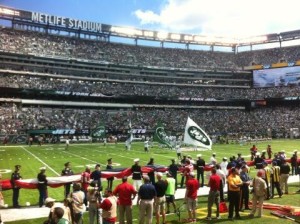 Thirteen months ago, Tampa Bay head coach Greg Schiano said that he didn’t ever want to be the least penalized team in the league. I don’t think Sunday’s game was exactly what Schiano had in mind.
Thirteen months ago, Tampa Bay head coach Greg Schiano said that he didn’t ever want to be the least penalized team in the league. I don’t think Sunday’s game was exactly what Schiano had in mind.
The Jets and Bucs battled in one of the closest games on Sunday, if not necessarily one of the most well-played ones. I was at the game, rooting on the home team, and can file this game under “all’s well that ends well.” While there are many takeaways from the game, the Bucs’ discipline problems will dominate discussion in Tampa Bay this week.
The Buccaneers looked unprepared at the start of the game and sloppy throughout. The Bucs were having some problems with Josh Freeman’s headset, which might explain why the team had to call timeout after an incomplete pass on the fourth snap of the game. But Tampa Bay followed that timeout with a delay of game (how?), which was followed by another delay of game (how??). That was followed by a sack, a false start, and then another false start.
The discipline problems continued throughout the game. Freeman wasn’t prepared for a Jeremy Zuttah snap, which resulted in a safety (and another penalty when Freeman kicked the ball out of the end zone). New Buc Dashon Goldson committed a brutal personal foul on Jets tight end Jeff Cumberland on one drive; on the next, the other safety, Mark Barron, was flagged for unnecessary roughness on an eight-yard pass to Jeremy Kerley on 3rd-and-21. That gave the Jets a first down, and let to New York’s only offensive touchdown of the game, a seven-yard throw from Geno Smith to ex-Buc Kellen Winslow.
Leading 14-12 in the fourth quarter, the Jets had 3rd-and-6 from their own 27. Smith couldn’t find anyone and ran out of bounds, but a defensive holding kept the drive alive (which led to a field goal). But despite all the penalties, Tampa Bay still managed to gain the lead in the game’s final minute. With 15 seconds remaining, the Jets had the ball at their own 45, a good 15-20 yards away from field goal range. Geno Smith scrambled and ran out of bounds with seven seconds left, placing the Jets at the Tampa Bay 45-yard line. But after the play, second-year linebacker Lavonte David was flagged for a personal foul, putting the Jets in field goal range. Nick Folk connected from 48 yards out, and David’s blunder is up there with Dwayne Rudd‘s helmet toss as the most costly penalties of the last 15 years.
[continue reading…]
1) Punting is not the way to beat Manning
Facing 4th and 5 from the Broncos 40-yard line, Harbaugh elected to punt up 14-7 with 8 minutes left in the second quarter. Last year, I highlighted one of the most difficult fourth down decisions coaches have to make: 4th-and-7 from between the 34- and 38-yard lines. In the thin air of Denver and with strong-legged Justin Tucker, we can safely include this scenario in that definition of No Man’s Land. Facing 4th-and-5 is a lot easier than 4th-and-7, so going for it would have been my preferred choice. The Ravens elected to punt, but let’s consider the other two options.
[continue reading…]
Last night, David Wilson ran 84 yards for a touchdown on the Giants first play from scrimmage. Without being touched. How does that happen? Let’s start with a look from the end zone right at the snap:

The Jets are lined up with four down linemen: from left to right, you can see DE Muhammad Wilkerson, first-round tackle Sheldon Richardson, backup NT Damon Harrison, and outside linebacker/edge rusher Garrett McIntyre. At linebacker, we see Calvin Pace, David Harris, and Demario Davis — the new starter whom Rex Ryan has compared to Ray Lewis — tight inside the tackles. Left cornerback Kyle Wilson is off screen, covering Rueben Randle on the Giants right, while the Jets show a single-high safety look: Dawan Landry, the free agent addition from Jacksonville, is 13 yards off the line of scrimmage, while safety Antonio Allen (the Jets 7th round pick a year ago and expected starter in 2013) has creeped towards the line. What’s not shown: a few seconds earlier, the Giants motioned TE Brandon Myers to the offense’s left before the snap, causing Antonio Cromartie to line up right in the face of Hakeem Nicks and Allen (39) to drop down closer to the line of scrimmage (he was ten yards off the line before Myers moved).
The Giants know what is coming: a handoff to David Wilson, who will read the Jets defense to determine whether he bursts up the gut or bounces outside. From a numbers game, the Giants like what they see: even after Allen comes down, the math looks even. Assuming Nicks can handle Cromartie (he will), the Giants have the center, left guard, left tackle, Myers (a yard off the line) and TE Bear Pascoe (playing the traditional fullback slot) to block five Jets – Harrison and McIntyre on the line, Harris and Davis in the second level, and Allen.
In theory, you would think the Giants would have the C block the NT, the uncovered LG would make a beeline towards Harris (52), the LT would take care of McIntyre, and Pascoe and Myers would be assigned to Davis (56) and Allen (39). Some of that happens — the center (backup Jim Cordle) handles the nose; he also gets an assist from LG Kevin Boothe, who nudges Harrison away from the play a second before he manhandles Harris (a mismatch for most linebackers, so we can’t be too harsh on Harris). LT Will Beatty also overpowers the RDE, McIntyre, unsurprising considering (1) Beatty is a pretty good player and McIntyre is a backup 3-4 OLB, and (2) Beatty outweighs him by 64 pounds. Credit the Giants for good blocking, but blocking your assigned man doesn’t turn into 84-yard runs very often. The real cuprit on the play is Allen, but he was only the last domino to fall.
[continue reading…]
Last week, Jason Lisk wrote a great article analyzing a number of key offensive injuries around the league last week. While Football Perspective hasn’t taken a day off since opening, this is not the go-to site for current events. But today, we’ve got something special in store for you. I was able to get thirteen top-notch writers to join me at a virtual roundtable and provide updates on some of the more important injuries to offensive players around the NFL.
Let’s start in New England, where the Patriots are having all sorts of tight end problems. Three months ago, the team’s top three tight ends were a relatively healthy Rob Gronkowski, Aaron Hernandez, and a recovering Jake Ballard. Since then, Hernandez has been released, Gronkowski may start the season on the PUP list, and Ballard is a possible camp cut as he recovers from the ACL and microfacture surgery that caused him to miss all of 2012. I’ve brought in Dr. Jene Bramel (@JeneBramel), author of the Second Opinion injury blog at Footballguys.com, to discuss the status of the Patriots tight ends:It’s really difficult to know what to expect from Gronkowski. He’s had two surgeries at two different disc levels in his lumbar spine. He recovered from the first one well, but it’s fair to wonder whether his lower back will hold up over time. And the infection and back surgery have limited his ability to fully rehab his arm. However, he’s just 24 years old and has seemed superhuman at times. I think Patriots fans can be optimistic that he’ll return close to his normal form this year. Whether that’s during the first month of season or not won’t be known until close to August 31. That’s when the Patriots must decide whether Gronkowski is safe to keep on the final 53.
I’m not expecting much from Ballard at all. Microfracture surgery is still difficult to fully recover from and rehabbing from an ACL tear at the same time adds to the level of difficulty. Even if Ballard does make the roster, it’s not likely that he’ll be healthy enough to play more than 20-30 snaps a game, much less make a meaningful contribution.
AFC East
Buffalo Bills – Punter Brian Moorman and defensive end Chris Kelsay are gone, so placekicker Rian Lindell — who is entering his 11th year of the service with the team — is now the longest-tenured Bill. Defensive back Terrence McGee had also been with the team since 2003, but he was released in the offseason. George Wilson is now in Tennessee, which means Kyle Williams (2006) is the most senior non-kicker.
Miami Dolphins – Long snapper John Denney (since 2005) is the longest-tenured Dolphin. After him, it’s punter Brandon Fields and defensive tackle Paul Soliai, both of whom joined Miami in 2007.
New England Patriots – no surprise here: Tom Brady has been around since 2000; the runner up is Vince Wilfork, who came aboard in 2004.
New York Jets – Bryan Thomas, Brandon Moore, and Sione Pouha were casualties of John Idzik’s offseason house cleaning. That leaves two 2006 first round picks — D’Brickashaw Ferguson and Nick Mangold — as the longest tenured players.
[continue reading…]
Before we get to my preview, I feel the need to point you to some excellent Super Bowl previews I saw this week:
- Bill Barnwell at Grantland with his excellent Super Bowl preview
- Chris Brown on the Ravens defense against the 49ers offense and the Ravens offense against the 49ers defense, both also at Grantland
- Aaron Schatz brings his Super Bowl Preview to Football Outsiders
- Sam Monson at Pro Football Focus also previewed the 49ers offense (and how to stop it) and the Ravens plan of attack
- Scott Kacsmar picked the Ravens in an upset and updated his impressive library of career playoff drive stats for quarterbacks
- Brian Burke is a big Ravens fan, but his model gives them only a 38% chance of success
- Last but not least, my old comrade Jason Lisk has been chronicling all things Super Bowl at the Big Lead
The Ravens can stop the zone read, but at what cost?
In Colin Kaepernick’s nine starts, the 49ers have averaged 159 rushing yards per game on 4.9 yards per rush and have rushed for 14 touchdowns; at the same time, they’ve averaged 8.1 ANY/A through the air. That makes them close to unstoppable, much like the Seahawks when Russell Wilson and Marshawn Lynch were dominating defenses over that same stretch.
For San Francisco, their dominance starts up front, and their offensive line needs only sustained success to rival what the lines of the ’90s Cowboys or ’00 Chiefs delivered. According to Pro Football Focus, left tackle Joe Staley is the best tackle in the league, while right tackle Anthony Davis is the second best run-blocking tackle in the league (behind only Staley). PFF ranks both Mike Iupati and Alex Boone as top-five guards in the league, and places both of them in the top three when it comes to run blocking. Center Jonathan Goodwin also ranks as an above-average center, and the 34-year-old veteran is more than capable of anchoring a line filled with Pro Bowl caliber players. As if that wasn’t enough, Vernon Davis is one of the top two-way tight ends in the league, while TE/H-Back/FB Delanie Walker and FB Bruce Miller provide excellent support in the run game.Without any schematic advantage, the 49ers have enough talented beef up front to have a dominate running game. But add in what Jim Harbaugh and Greg Roman have been able to do with the Pistol formation and the zone read, and you have a running game that borders on unstoppable.
We saw that against the Packers, as Colin Kaepernick broke the single-game rushing record by a quarterback. The beauty of the zone read is that it gives the offense an extra blocker, an advantage the 49ers didn’t need. After the Packers were shredded by Kaepernick, the Falcons focused on containing the quarterback. Take a look at the photograph below, courtesy of Ben Muth of Football Outsiders.
[continue reading…]
In my week 11 power rankings, when Baltimore was 8-2, I wrote: “According to Football Outsiders, Baltimore has the best special teams since 1991 through 10 weeks. Schatz tweeted that Baltimore’s the 16th best team based on just offense and defense.”
A few days later the Ravens defeated the Chargers in the famous 4th-and-29 game, which certainly didn’t change my outlook on Baltimore. Then the Ravens tanked down the stretch, seemingly fulfilling their reputation as an average team. And let’s not forget: had Ben Roethlisberger stayed healthy, it’s possible the Ravens don’t even make the playoffs. Without the 13-10 ugly win over Byron Leftwich and the Steelers, both Baltimore and Pittsburgh would have finished 9-7 with the Steelers holding the tiebreaker. To be fair, the Ravens did not compete in a meaningless week 17 game, but the point is that the Ravens were barely above-average team during the season that got a few breaks along the way.
[continue reading…]
To be fair, only three quarterbacks have done anything of note on the ground against the Falcons this year. Michael Vick rushed 7 times for 42 yards in a 30-17 loss. Vick had two first down carries that went for four yards, two third and long carries that went for 10 total yards but no first downs, and then three runs on 3rd and 3 or 4 where he picked up the first down. That’s not good, but not too alarming.
[continue reading…]
Yesterday, I previewed Saturday’s games with um, mixed results (skip the Denver-Baltimore preview and just read the San Francisco-Green Bay breakdown twice). Let’s take another crack at it by examining Sunday’s matchups.
Seattle Seahawks (11-5) (+1) at Atlanta Falcons (13-3), Sunday, 1:00PM ET
Once again, Atlanta is tasked with facing a dominant wildcard team. Is this the year Matt Ryan finally silences his critics?Atlanta is only a one-point favorite, just the seventh time a home team has been given such little respect this late in the season since 2000. Home teams are 3-3 when underdogs or small favorites over that span in the divisional conference championship rounds, although one of those losses came by the Falcons in 2010 against the Packers when Atlanta was a 1.5-point favorite. But let’s focus on these two teams, because the stats might surprise you.
Russell Wilson edges Matt Ryan in Y/A (7.9 to 7.7), AY/A (8.1 to 7.7), and passer rating (100.0 to 99.1), despite having a significantly worse set of receivers. Ryan does have the edge in NY/A (7.0 to 6.8) but the two are deadlocked in ANY/A at 7.0. Both quarterbacks led four 4th quarter comebacks this year, and Wilson led 5 game-winning drives while Ryan led six. Considering one quarterback has Roddy White, Julio Jones, and Tony Gonzalez, and the other is a 5’10 rookie, I consider this pretty remarkable.
[continue reading…]
I was on vacation last week, so I provided just a bare bones set of NFL playoff predictions. Technically, my picks went 4-0 on Wildcard Weekend, but that doesn’t count for much when you pick the favorite in every game. With a little more time on my hands, here’s an in-depth preview of Saturday’s games. Tomorrow I’ll be previewing Sunday’s action.
Baltimore Ravens (10-6) (+9.5) at Denver Broncos (13-3), Saturday 4:30PM ET
[continue reading…]
Before the playoffs start, I figured I should write down my predictions somewhere. I encourage everyone to post that predictions in the comments. Here are mine:
Wild Card Round
Saturday, Jan. 5, 4:30 p.m.: Bengals at Texans — Texans
Saturday, Jan. 5, 8:00 p.m.: Vikings at Packers — Packers
Sunday, Jan. 6, 1:00 p.m.: Colts at Ravens — Ravens
Sunday, Jan. 6, 4:30 p.m.: Seahawks at Redskins– Seahawks
Divisional Round
Saturday, Jan. 12, 4:30 p.m.: Ravens/ Colts/ Bengals at Broncos — Broncos
Saturday, Jan. 12, 8 p.m.: Packers/ Redskins/ Seahawks at 49ers — 49ers
Sunday, Jan. 13, 1 p.m.: Redskins/ Seahawks/ Vikings at Falcons — Seahawks
Sunday, Jan. 13, 4:30 p.m.: Texans/ Ravens/ Colts at Patriots — Patriots
Conference Championship Round
Sunday, Jan. 21: 3:00 p.m.: Seahawks at 49ers — 49ers
Sunday, Jan. 21: 6:30 p.m.: Patriots at Broncos — Broncos
Super Bowl
Sunday, Feb. 3, 2013 – 6:30 p.m.: Broncos vs. 49ers — Broncos
With week 16 in the books, it’s time to take a look at the playoff picture. In the AFC, it’s simple: we know the six teams that will be in the post-season. In the NFC, there are two spots still remaining and five teams trying to claim them. In both conferences, there will be battles for byes in week 17.
AFC
The 12-3 Houston Texans are suddenly in a freefall, and could drop from the presumptive number one seed to having to win in the first round of the playoffs. If Houston loses in Indianapolis, the Texans are vulnerable to being caught by either Denver (home against Kansas City) or New England (home against Miami), or both. There’s likely no middle ground, since the Broncos and Patriots are big favorites, meaning it’s the #1 seed or no bye for Houston. Still, Houston is likely to get the top seed in the AFC. After all, the Colts did just struggle mightily to handle the worst team in the NFL.
Denver can secure a bye by beating Kansas City or having the Dolphins beat the Patriots, and would earn home field advantage throughout the playoffs with a win and a Colts victory. The likely result for Denver is the #2 seed
The Patriots are third in the pecking order with four losses. They could drop to the #4 seed with a loss and a Ravens victory over Cincinnati, but that doesn’t mean much: a home game against Indianapolis won’t scare New England and might even be an easier matchup than facing A.J. Green and Geno Atkins. The real drama is whether Denver or Houston falls, giving New England a chance for a bye or even home field. While the Patriots could end up being slotted from 1 to 4 in the AFC, expect each of the top three seeds to take care of business, and New England to finish as the #3 seed.
Because the Browns defeated the Bengals, the Ravens hold the tiebreaker over Cincinnati. Both teams split with Pittsburgh, and would split with each other if Cincinnati defeats Baltimore on Sunday, but Baltimore’s sweep of Cleveland would give them the division even if they lose to Cincinnati in week 17. Baltimore has little to play for in Cincinnati; the irony is that if Baltimore defeats the Bengals and the Patriots lose, the two teams would face off again in the first round of the playoffs in Baltimore. Still, the likely scenario is Baltimore staying at the 4 seed and hosting the Colts in the first round of the playoffs.The Colts are the feel good story of the year, and Chuck Pagano comes back to coach the team this weekend. It’s actually a meaningless game for Andrew Luck and the Colts on Sunday, as they can’t improve their playoff positioning. In fact, they can only hurt it: a victory over Houston in week 17 means, assuming the Patriots defeat the Bengals in the first round of the playoffs, that the Colts would face the Broncos instead of the Texans in the second round. In any event, we know that the Colts are the 5 seed and unless the Patriots lose and the Ravens win, will travel to their old stomping grounds in Baltimore in the first round of the playoffs. Expect that to be a very emotional game and for the Ravens crowd to give a warm #Chuckstrong welcome to their former defensive coordinator.
NFC
Matt Ryan and the Falcons have clinched the #1 seed in the NFC. For all the bashing Atlanta seems to take, they might end up winning three more games than any other team in the conference. However, the most likely opponent in the first round of the playoffs is Seattle, which would be a fascinating contrast in styles. The Falcons will face the winner of the 4/5 game or the 6 seed, but since the 6 seed will likely play in San Francisco, and the Seahawks look much better than either the Redskins or the Cowboys, my money is on Seattle-Atlanta in round two.
Green Bay is the frontrunner to win the #2 seed and secure the other bye in the conference. The NFC East winner is out, so the #2 seed comes down to either the Packers or the NFC West winner. Green Bay gets the #2 spot with a win, or with losses by both the Seahawks and 49ers. I wouldn’t count on that. Winning in Minnesota is not going to be easy — Adrian Peterson will be chasing Eric Dickerson’s rushing record and the Vikings are in a “win and you’re in” scenario themselves — but I’d still make Aaron Rodgers and the Packers the favorites. If the Packers lose in Minnesota, their punishment is a first round visit from the Vikings.San Francisco can still finish as the #2, #3, or #5 seeds. The 49ers get a bye if the Packers lose and the 49ers win, but more likely, San Francisco defeats Arizona and ends up as the #3 seed in the NFC. The 49ers could also get the #3 seed with a loss if the Seahawks lose at home against the Rams, but good luck with that. If San Francisco loses at home to Arizona, the 49ers will likely get what they deserve — the fifth seed and a trip to either Washington or Dallas in the first round of the playoffs.
The NFC East will be decided in Washington on Sunday. If the Redskins win, which would be my prediction, Washington will win the division at 10-6. The ‘Skins have another out, as they could get the 6 seed even if they lose to the Cowboys. At 9-7, Washington would have the tiebreaker over Minnesota based on head-to-head record, so if the Vikings and Bears lose to Green Bay and Detroit, Washington is in the playoffs. Assuming the Redskins make the post-season, Luck would be joined by fellow rookies Robert Griffin III and Russell Wilson in the playoffs, an NFL first.
Meanwhile, the Cowboys face your basic ‘win and you’re in’ scenario. At 8-8 they can’t make the playoffs, so it’s just a question of whether they can defeat the Redskins and claim the NFC East. The other interesting thing to keep an eye on: Tony Romo is only 315 yards away from hitting the 5,000-yard mark, although he trails both Drew Brees and Matthew Stafford in the race for the passing crown.By defeating San Francisco on Sunday night, the Seahawks clinched the #5 seed in the NFC. While the Bears and Vikings could get to 10 wins, Seattle defeated both teams, so Seattle’s fate is secure as no worse than the 5th seed and is rewarded with a trip to either Washington or Dallas in the first round of the playoffs.
That leaves just the sixth seed up for grabs. If the Vikings defeat the Packers, they’d get the #6 seed and likely travel to Lambeau Field in the first round of the playoffs. No word on whether Brett Favre would be in attendance. Minnesota has the tiebreaker over the Bears because Green Bay swept Chicago, while in this scenario, the Vikes would end up 4-2 in the division. Chicago therefore needs Minnesota to lose and to win in Detroit to get the #6 seed. If both teams lose, the Redskins then would slot into the 6 seed even if they lose.
You might notice we’re missing a certain team from New York. Well, the Jets have struggled this season, and the Mark Sanchez/Tim Tebow/Greg McElroy circus has only gotten more depressing. Oh wait, there’s another team in New York, right? Well, the Giants can’t win the division, but could get a wildcard berth. They would need the other teams they’d be battling for the final spot — Chicago, Minnesota, and Dallas — to lose to Detroit, Green Bay, and Washington, in addition to taking care of business against the Eagles. The longshot there would be the Lions defeating Chicago, but otherwise, it’s not a completely far-fetched scenario.

